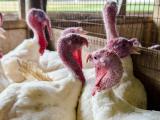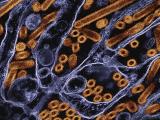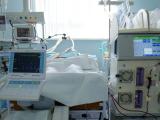Apr 9, 2013 (CIDRAP News) – China's number of confirmed human infections with H7N9 influenza grew to 28 today, as two new cases each from Zhejiang province and Shanghai were added, according to media reports citing official sources.
Two more H7N9 deaths were reported, both in previously confirmed cases, raising the fatality total to nine. The newest reported cases appear to fit a general pattern that has emerged so far: middle-aged and older adults from areas of eastern China that reported earlier cases.
Xinhua, China's state news agency, reported that the patients died this afternoon. One is a 35-year-old woman from Anhui province whose infection was first announced 10 days ago, one of the first three reported, and the other was an 83-year-old man from Jiangsu province whose case was initially reported 7 days ago.
The newest confirmed cases include two patients from Zhejiang province, a 51-year-old woman who is in stable condition and a 79-year-old man who is in critical condition, according to the Xinhua report, which did not include illness-onset dates for the patients. Zhejiang province is about 125 miles southwest of Shanghai and has already reported three H7N9 cases, two of them fatal.
The other two confirmed H7N9 patients are from Shanghai, a 62-year-old man a 77-year-old man who are both in stable condition, according to Xinhua, which said the older man started having symptoms on Apr 3, which is the latest illness-onset date known so far.
The developments push the number of cases in Shanghai to 12, of which 4 were fatal. Detection of the first human H7N9 cases there sparked testing in the city's poultry and agricultural market, which revealed the virus in a small number of pigeons, chickens, and environmental samples.
An update from the World Health Organization (WHO) today, which added three new cases reported by China yesterday, included some new details. It noted that the 25-year-old woman from Jiangsu province is pregnant and is in critical condition. She got sick on Mar 30.
The WHO said close monitoring is under way for more than 600 close contacts of confirmed patients. An investigation is still ongoing into a symptomatic contact of one of Jiangsu province's previously reported cases.
So far there is no evidence of human-to-human spread, the WHO said.
The European Centre for Disease Prevention and Control (ECDC) today issued an epidemiologic update on the new virus, which said no epidemiological links have been found among any of the patients so far, based on China's total from yesterday. It said a small family cluster of illnesses had been reported in the first patient confirmed with the illness—an 87-year-old man from Shanghai who died—but lab testing has not confirmed additional infections.
More sporadic cases in China are likely to be reported, and given no evidence of human-to-human spread of the virus, the ECDC said it considers the risk in Europe to be low, though it couldn't rule out the possibility of individual cases coming from China.
As human cases mount, intensive efforts continue in China to identify the source of the infections. Gregory Hartl, a WHO spokesman, said today that tests have not yielded H7N9 in samples from Chinese pigs so far, Xinhua reported today.
In a separate report, the news organization said that among 738 samples collected from three poultry markets in Shanghai, 20 were positive for the virus: 10 from chickens, 3 from pigeons, and 7 from the environment.
Meanwhile, authorities are taking a variety of response measures to limit the possible exposure to and spread of H7N9. Sanitation workers were reportedly seen destroying bird nests on the Shanghai Jiaotong University campus, the China Internet Information Center, a Web portal authorized by China's government, reported yesterday.
A photo of workers reportedly removing the nests appeared on Sina Weibo, a Chinese social media site. An official from the Shanghai Disease Control and Prevention Center said there is no evidence that the birds are infected with H7N9 and pose a threat to the campus, and there is no need to destroy the nests. So far authorities have found no evidence of the new virus in wild birds in China.
Also, a pigeon racing association has cancelled its upcoming events and is asking owners to keep their birds caged for the next 2 months to prevent infection with the new virus, the Associated Press (AP) reported today. The Hangzhou Carrier Pigeon Association also said it would vaccinate up to 90,000 birds to protect them from influenza, though a specific vaccine against the new strain hasn't been developed yet.
The pigeons that tested positive for the new virus at two agricultural markets in Shanghai were birds raised for consumption. Avian flu experts have said pigeons appear to be less suitable hosts for avian influenza viruses, compared with other bird species.
See also:
Apr 9 Xinhua story on two new deaths
Apr 9 Xinhua story on four new cases
Apr 9 WHO update
Apr 9 ECDC update
Apr 9 Xinhua report on pig testing
Apr 9 Xinhua report on poultry market sampling
Apr 8 China.org report
Apr 9 AP story



















